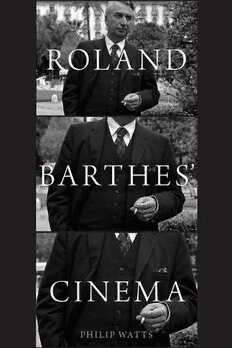
Roland Barthes’ cinema PDF
Preview Roland Barthes’ cinema
ROLAND BARTHES’ CINEMA ROLAND BARTHES’ CINEMA Philip Watts MANUSCRIPT EDITED FROM THE AUTHOR’S UNFINISHED CHAPTERS Dudley Andrew Yves Citton Vincent Debaene Sam Di Iorio 1 1 Oxford University Press is a department of the University of Oxford. It furthers the University’s objective of excellence in research, scholarship, and education by publishing worldwide. Oxford is a registered trade mark of Oxford University Press in the UK and certain other countries. Published in the United States of America by Oxford University Press 198 Madison Avenue, New York, NY 10016, United States of America. © Sophie Queuniet 2016 First Edition published in 2016 All rights reserved. No part of this publication may be reproduced, stored in a retrieval system, or transmitted, in any form or by any means, without the prior permission in writing of Oxford University Press, or as expressly permitted by law, by license, or under terms agreed with the appropriate reproduction rights organization. Inquiries concerning reproduction outside the scope of the above should be sent to the Rights Department, Oxford University Press, at the address above. You must not circulate this work in any other form and you must impose this same condition on any acquirer. Library of Congress Cataloging- in- Publication Data Names: Watts, Philip, 1961– 2013. | Andrew, Dudley, 1945– editor. | Barthes, Roland. Essays. Selections. English. Title: Roland barthes’ cinema / Philip Watts ; manuscript edited from the author’s unfinished chapters by Dudley Andrew, Yves Citton, Vincent Debaene, Sam Di Iorio. Description: New York, NY : Oxford University Press, 2016. | Includes bibliographical references and index. Identifiers: LCCN 2015037603| ISBN 9780190277543 (cloth) | ISBN 9780190277550 (pbk.) | ISBN 9780190277567 (updf) Subjects: LCSH: Barthes, Roland— Criticism and interpretation. | Motion pictures—P hilosophy. Classification: LCC PN1998.3.B3748 W38 2016 | DDC 791.43092— dc23 LC record available at http://l ccn.loc.gov/2 015037603 1 3 5 7 9 8 6 4 2 Printed by Webcom, Canada CONTENTS Editors’ Preface ix Introduction 1 1. A Degraded Spectacle 9 The Interpreter and the Sensualist 10 Roman Hair 12 A Cold War Cinema 14 Demystification, 1957 17 “The Face of Garbo” 20 2. Refresh the Perception of the World 25 “On CinemaScope” 26 Barthes and the New Wave 28 3. Barthes and Bazin 35 Lost Continent 36 From Ontology to Rhetoric and Back 40 Camera Lucida 45 Contents 4. Another Revolution 49 The Fetishist 50 Eisenstein, 1970 55 Coda: From Leftocracy to Affect and Intimacy 58 5. Leaving the Movie Theater 61 The Science of Filmology 62 Apparatus Theory 65 The Aestheticization of the World 69 A Long Conversation with Christian Metz 71 Leaving Theory 75 6. The Melodramatic Imagination 77 The Brontë Sisters 77 The New Wave’s Melodramatic Turn 80 Michel Foucault’s Melodramatic Imagination 85 Barthes and Foucault 89 Barthes and Truffaut: Melodramatic Photography 91 Conclusion: From Barthes to Rancière? 96 Interview With Jacques Rancière 100 Nine Texts on the Cinema by Roland Barthes 113 Angels of Sin (Les Anges du péché, 1943) 113 On CinemaScope 116 Versailles and its Accounts 117 Cinema Right and Left 121 On Left- Wing Criticism 124 “Traumatic Units” in Cinema: Research Principles 127 vi Contents Preface to Les Inconnus de la terre (Strangers of the Earth, Mario Ruspoli, 1961) 137 Answer to a Question about James Bond 137 Sade—P asolini 138 Notes 141 Bibliography 163 Index 179 vii EDITORS’ PREFACE For Sophie, Madeleine, and Louise The life of Roland Barthes, last century’s cleverest cultural critic and one of its most nimble and influential literary theorists, coincided with that century’s most powerful artistic medium. Born the year of Birth of a Nation, he achieved adolescence at the coming of sound, and died in 1980 before videotape and digital technology decisively altered the viewing and making of films. This was the year Global Hollywood showed it could exercise its power, as The Empire Strikes Back blanketed the world in a new mystique, if not a new mythology. But it was also the year something as cerebral and poetic as Tarkovsky’s Stalker managed to claim the higher ground that art cinema had struggled to gain for three decades, the decades corresponding in fact to Barthes’ illustrious career, the 1950s, 1960s, and 1970s. There simply must have been a connection between Roland Barthes and cinema; and indeed there was one— more than one, as we shall see— but it is not simple to identify or track. For cinema troubled Barthes; his relations with it were intermittent, ambiv- alent, and variable. Just as his criticism can be parsed into phases (mythologies, struc- turalist semiotics, poststructuralism, and autobiography), so the cinema meant different things to Barthes at different times. Not to mention the
